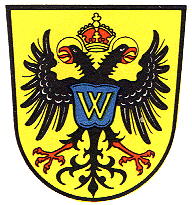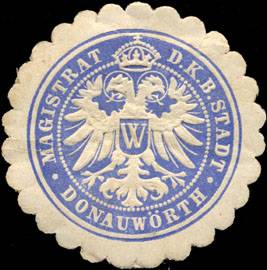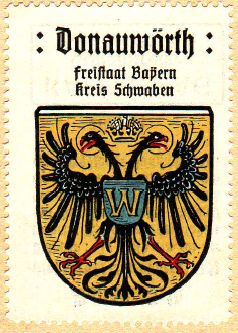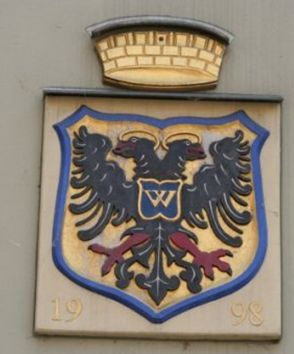Donauwörth: Difference between revisions
Knorrepoes (talk | contribs) No edit summary |
Knorrepoes (talk | contribs) |
||
| Line 23: | Line 23: | ||
|align="center"|[[File:donauworthz1.jpg|center]] <br/>Seal from around 1900 | |align="center"|[[File:donauworthz1.jpg|center]] <br/>Seal from around 1900 | ||
|align="center"|[[File:donauworth.hagd.jpg|center]] <br/>The arms in the [[Kaffee Hag albums]] +/- 1925 | |align="center"|[[File:donauworth.hagd.jpg|center]] <br/>The arms in the [[Kaffee Hag albums]] +/- 1925 | ||
|- | |||
|align="center"|[[File:donauworth1.jpg|center]] <br/>The arms on the local city hall | |||
|} | |} | ||
Revision as of 08:44, 28 October 2012
| Heraldry of the World Civic heraldry of Germany - Deutsche Wappen (Gemeindewappen/Kreiswappen) |
DONAUWÖRTH
State : Bayern
District (Kreis) : Donau-Ries (until 1972 Donauwörth)
Additions : 1971 Auchsesheim, Nordheim, Zirgesheim; 1972 Riedlingen, Zusum-Rettingen (partly); 1973 Berg; 1978 Wörnitzstein; Schäfstall
Official blazon
Origin/meaning
Donauwörth was an imperial city in the early 13th century. The oldest seal, dating from around 1240, thus shows the imperial eagle flanked by a cross and a star. Until 1529 the seals showed the eagle flanked by two star-shaped flowers.
The present arms were granted by Emperor Charles V on October 21, 1530. The eagle is again the imperial eagle, the letter W the initial of Wörth. The arms have not changed since, except from 1818-1836, when the city was ordered to replace the eagle with the lion of Bayern.
| Seal from around 1900 |
The arms in the Kaffee Hag albums +/- 1925 |
| The arms on the local city hall |
Literature : Stadler, 1964-1971, 8 volumes; Hupp, O: Kaffee Hag albums, 1920s




